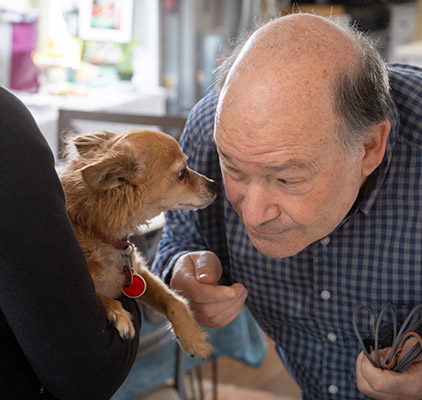Geriatric Pet Support

Does your pet manifest signs of chronic, age-related conditions that are threatening to impair her or his quality of life? Common conditions affecting aging dogs and cats include arthritic joints, cancer, impaired function of the heart, kidneys and digestive organs, diabetes, thyroid disorders, decreased hearing and vision, and cognitive dysfunction (senility).
With the onset of age-related changes, our goal at Compassionate Veterinary Hospice is to provide you and your pet extra support during times of increased needs.
Protecting older pets from pain
Protecting older pets from pain is a frequent concern for their owners/caregivers. When pet is are experiencing chronic pain, you may see behavior changes such as decreased activity, slow or stiff gait, and decreased appetite, among others. However, these common signs of pain are often missed, attributed to “old age” instead. Our veterinarians’ experience and expertise in recognizing and managing older pets’ chronic pain are unparalleled. We are passionate about ensuring the animals in our care are as comfortable as they can possibly be. Successful chronic pain management depends on your astute observations of subtle behavior changes, and on correctly interpreting what those changes mean from your pet’s point of view. Regular communication, frequent adjustments to the treatment protocol, and periodic reassessment ensure the best outcome for each pet.
Other senior pet discomforts
Many symptoms commonly affecting older dogs and cats are obvious to the attentive owner/caregiver:
- New lumps or old ones that are rapidly changing
- Diarrhea, vomiting or constipation
- Difficulty breathing, shortness of breath
- Coughing
- Stiffness or limping
- Weakness, loss of balance
- Changes in appetite
- Changes in water intake or urination
- Increased vocalization
- Incontinence (sometimes evidenced by accidents in the house)
- Uncharacteristic aggression or other behavioral changes
- Unexplained fluctuations in your pet’s weight
Your observations are crucially important in helping your pet maintain the best possible quality of life. Take note of any changes when you notice them; keep track (by written record if possible); and communicate regularly with the Compassionate Veterinary Hospice team.

